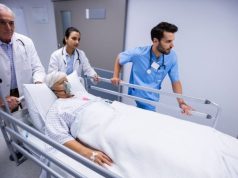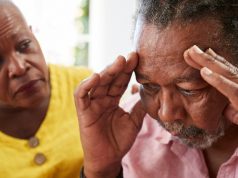The American Heart Association’s International Stroke Conference
The American Heart Association/American Stroke Association’s annual International Stroke Conference was held from Feb. 22 to 24 in Houston and attracted nearly 4,000 participants from around the world, including cerebrovascular research and practice experts. The conference featured more than 1,500 presentations that emphasized basic, clinical, and translational medicine, as well as providing insight into the prevention, management, and treatment of stroke.
In one study, James E. Faber, Ph.D., of the University of North Carolina in Chapel Hill, and colleagues found that patients with a prior history of regular physical activity have better outcomes after stroke.
“Specialized vessels in the brain, called collaterals, provide alternative routes for perfusion when an ischemic stroke occurs. Unfortunately, collaterals are progressively lost with aging, beginning in middle age in mice, and there is indirect supportive evidence in humans,” Faber said. “Our study found that mice who were given free access to running wheels when they reached middle age (equivalent to approximately 40 human years), and thus ran daily, showed no loss of collaterals even by the time they reached 75 human year-equivalent age, compared to sedentary age-matched mice. They also sustained much less severe strokes. Therefore, regular aerobic exercise beginning in middle age protected the collateral circulation from aging-associated rarefaction and thus preserved collateral blood flow and prevented the increase in stroke severity known to occur with aging.”
In another study, Neal S. Parikh, M.D., of the NewYork-Presbyterian Hospital/Weill Cornell Medical Center in New York City, and colleagues found that elderly Americans, specifically Medicare beneficiaries, with liver cirrhosis faced an increased risk of stroke, and that the association between cirrhosis and stroke appeared to be stronger for hemorrhagic than ischemic stroke.
“Liver cirrhosis does not appear to be protective against stroke, particularly hemorrhagic stroke, in elderly patients with other stroke risk factors,” Lehman said. “Physicians caring for patients with liver cirrhosis should also address these patients’ vascular comorbidities as aggressively as otherwise warranted and safe.”
Emily C. Maxwell, Ph.D., of the University of Colorado School of Medicine in Aurora, and colleagues evaluated 50 children who suffered an arterial ischemic stroke during childhood. The parents of these children completed a questionnaire assessing emotional and behavioral difficulties.
“Increased symptoms of depression, anxiety, physical complaints, and behavioral problems were seen in children with stroke compared to a normative sample of typically developing peers. Children who had a stroke at an earlier age (before age 6) were found to have higher levels of anxiety than children who had a stroke at a later age (after age 10),” Maxwell said. “Careful screening for emotional and behavior difficulties after childhood stroke are necessary. Children with high levels of these difficulties should be referred for psychological therapy.”
ASA: Vagus Nerve Stimulation May Enhance Stroke Recovery
WEDNESDAY, March 1, 2017 (HealthDay News) — In a study presented at the annual American Stroke Association’s International Stroke Conference, held from Feb. 22 to 24 in Houston, vagus nerve stimulation (VNS) enhanced arm movement in a small group of stroke patients with chronic arm weakness.
ASA: Male Stroke Patients Twice As Likely to Get Timely tPA
FRIDAY, Feb. 24, 2017 (HealthDay News) — Male stroke patients are more than twice as likely as female patients to receive tissue plasminogen activator treatment within 30 minutes of hospital arrival, according to research presented at the annual American Stroke Association’s International Stroke Conference, held from Feb. 22 to 24 in Houston.
Press Release
More Information
ASA: Pre-Hospital tPA May Reduce Stroke Disability
FRIDAY, Feb. 24, 2017 (HealthDay News) — Patients transported in an ambulance specially equipped to diagnose and treat stroke on route to the hospital have a lower risk of stroke-related disability than patients who receive tissue plasminogen activator (tPA) at the hospital, according to research presented at the annual American Stroke Association’s International Stroke Conference, held from Feb. 22 to 24 in Houston.
Press Release
More Information
ASA: Class-Specific Link Between Periodontal Disease and Stroke
THURSDAY, Feb. 23, 2017 (HealthDay News) — Adults with periodontal disease may be twice as likely as people with healthy gums to suffer a stroke, according to research presented at the annual American Stroke Association’s International Stroke Conference, held from Feb. 22 to 24 in Houston.
Press Release
More Information
ASA: Not Enough Stroke Patients Being Treated With tPA
THURSDAY, Feb. 23, 2017 (HealthDay News) — Blacks, Hispanics, women, seniors on Medicare, and patients in rural areas are less likely to be treated with tissue plasminogen activator (tPA) after stroke, according to research presented at the annual American Stroke Association’s International Stroke Conference, held from Feb. 22 to 24 in Houston.
Press Release
More Information
ASA: Exercise Boosts Cognitive Function After Stroke
THURSDAY, Feb. 23, 2017 (HealthDay News) — A structured exercise program can help stroke survivors recover not only physically but cognitively as well, according to research presented at the annual American Stroke Association’s International Stroke Conference, held from Feb. 22 to 24 in Houston.
Press Release
More Information
ASA: Headache Precedes Stroke More Often in Kids Than Adults
THURSDAY, Feb. 23, 2017 (HealthDay News) — Children are much more likely than adults to have a headache before an ischemic stroke, according to research presented at the annual American Stroke Association’s International Stroke Conference, held from Feb. 22 to 24 in Houston.
Press Release
More Information
Copyright © 2017 HealthDay. All rights reserved.







